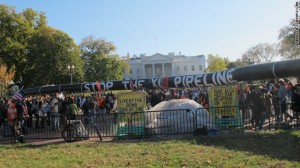
The Keystone XL Pipeline extension proposed by TransCanada is current in planning limbo after the November 10 decision by the Obama administration not to make a decision on going ahead with or killing it. If and when built, it would bring crude from Alberta, Canada’s oils sands to the Gulf Coast of the US. The indecision stems from the usual clash of the oil industry’s interests against those of the environmental lobby.
Those in favor of the extension note that it will bring construction jobs the the Great Plains; the investment will amount to around $7 billion. Moreover, the oil from Canada is far more secure than oil from the Middle East, and Canada is a far more palatable business partner than many places that supply the US.
Those opposed point out that the 1,700 mile pipeline’s proposed path takes the oil through the habitat of imperiled wildlife and over the Ogallala Aquifer, which is a major source of drinking water for Nebraska and a few other states. Moreover, the environmental lobby is not pleased about the development of the oil sands in the first place.
The State Department had promised to give TransCanada an up or down decision by year-end. The review of the proposal has already gone on for three-plus years. The Washington Post reported this morning, “Kerri-Ann Jones, assistant secretary in the Bureau of Oceans and International Environmental and Scientific Affairs, told reporters that choosing a new route for the Nebraska portion of the pipeline will require a new environmental assessment, which will probably take at least 15 months.” The presidential election is in 12 months. The White House denies that there was any political consideration involved in the decision not to decide.
Meanwhile, the Canadian government has been working to get a spotlight focused on the issue by visits of various high-level officials to the US and by holding informational meetings. Just this week, it arranged for US journalists and energy analysts to visit Alberta, talk to leading politicians and spend a day at Ft. McMurray, the oil sands hub.
At a Foreign Policy Association meeting earlier this year (see my post of May 22, 2011), Alberta’s Energy Minister Ron Liepert said that building a pipeline that goes south is his preferred option, but he also stated that, to do right by his province, a pipeline that takes the oil west toward Asian consumers would work, too.
With the decision put off, the story is likely to fade from the headlines. However, the back-room wheeling and dealing is likely to intensify. Stay tuned.